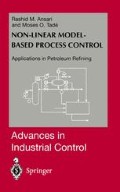Abstract
The specific objectives of this study, stated in Section 1.3, have been achieved. The overall scope of this study described in Section 1.4 has also been completed. The non-linear model-based multivariable control algorithms and constrained non-linear optimization strategies were developed and an integrated approach of the control strategy was proposed and applied to various refinery processes. This integrated approach entailed incorporating a process model, an inferential model and multivariable control algorithm and constrained non-linear optimization strategies in one framework.The scope of work summarized in Section 1.4 has been successfully completed. The main features of the completed work are as follows:
-
1.
Extended the non-linear model-based control structure of Lee and Sullivan (1988) to permit the use of inferential models in non-linear multivariable control applications
-
2.
Developed a wide range of inferential models such as the iso-pentane (iC5) and RVP for debutanizer; naphtha final boiling point and kerosene flash point for crude fractionator and octane number for catalytic reforming process. Implemented these models in real-time and integrated with non-linear multi variable control applications to form a closed-loop quality control.
-
3.
Designed and developed non-linear control strategies for industrial debutanizer using steady state model with approximate dynamics and implemented the control strategies in real time.
-
4.
Developed a complex non-linear multivariable control structure by formulating the constrained non-linear optimization method that optimizes the performance objectives for crude distillation process subject to constraints. Shell heavy oil fractionator was selected for this purpose, the process dynamic model was built by process identification tests and the model uncertainty was considered explicitly in non-linear controller design. The non-linear control strategies were tested on a 120,000 barrels per day crude-fractionator.
-
5.
Developed a constrained non-linear optimization algorithm for the reactor section of semi-regenerative catalytic reforming process. Also simulated a dynamic model of the catalytic reforming process and developed an inferential model to predict the reformate octane. Integrated all these models in non-linear model-based control structure and implemented control strategies in real-time.
-
6.
Extended the application of constrained non-linear multivariable control and optimization to more complex process such as the fluid catalytic cracking (FCC) and developed the dynamic parameter update algorithm for the FCC to reduce the effect of larger modelling errors by regularly updating the selected model parameters. Developed a simplified dynamic model of the process and tested the model in real-time to provide the initial targets for the non-linear controller.
Access this chapter
Tax calculation will be finalised at checkout
Purchases are for personal use only
Preview
Unable to display preview. Download preview PDF.
Author information
Authors and Affiliations
Rights and permissions
Copyright information
© 2000 Springer-Verlag London Limited
About this chapter
Cite this chapter
Ansari, R.M., Tadé, M.O. (2000). Conclusions and Recommendations. In: Nonlinear Model-based Process Control. Advances in Industrial Control. Springer, London. https://doi.org/10.1007/978-1-4471-0739-2_8
Download citation
DOI: https://doi.org/10.1007/978-1-4471-0739-2_8
Publisher Name: Springer, London
Print ISBN: 978-1-4471-1192-4
Online ISBN: 978-1-4471-0739-2
eBook Packages: Springer Book Archive

